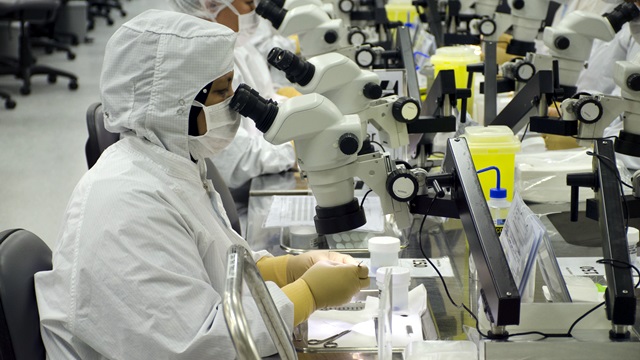Recent years have seen Singapore’s government work towards the improvement of its life sciences industry to great success. And now, following an unexpected GDP growth in 2017 and strong and stable growth predicted for this year, there is rise in demand for candidates in the commercial sectors and manufacturing as the industry keeps one eye on the arrival of digital health and AI on the horizon.
Roles of major prominence for the rest of the year are expected to include Commercial, Diagnostics, Genomics, Informatics, Manufacturing quality and Manufacturing engineering
With the R&D sector waning in its prominence, the key area of growth is expected to be in the commercial sectors where candidates experienced in sales and marketing are required more than ever, according to Grant Torrens, Business Director at Hays Singapore. “Companies are really looking to bolster their sales departments. Even if they are doing their manufacturing outside of Singapore, they still need individuals who can deal with B2B sales,” Grant says.
This uptick shows a marked difference to what was seen in the previous year, a time characterised by replacement and junior sales staff hires. But now, as the market looks likely to hold strong in the coming year, companies are revising strategies. “Last year our clients were not looking to pile investment into sales teams because predictions pointed to a year of stagnation,” Grant explains. “However, now companies are becoming more confident in scaling out their sales departments, and to this end there is a rising trend towards the recruitment of more senior candidates.”
As well as GDP growth, the Singapore government’s interest in the industry through the Economic Development Board (EDB) and schemes such as RIE2020 has encouraged further external investment. “The government here has invested a lot of money to make sure that Singapore is known as a pharmaceutical hub. This has attracted a lot of big name companies to set up regional headquarters here and, where possible, manufacturing plants as well,” Grant notes. “Recently we have seen a number of blue chip companies open up plants in Singapore, something that we expect to continue to improve.”
With historical investment engendering current gains, the industry is looking to the future, which undoubtedly consists of Artificial Intelligence (AI), robot doctors and MedTech. This means that Singapore’s life sciences industry is seeing a demand for candidates in the area of diagnostics, informatics and genomics. “Traditionally companies have required large machines in hospitals for imaging diagnostics, but there has been strong investment in AI technology leading to huge potential in the Singapore market,” Grant continues.
“From a digital point of view, the use of MedTech in genomics is going to change the face of medicine in the same way that Apple revolutionised the mobile phone, computer and music industries. With this disruptive technology comes great opportunities to advance for many companies in Singapore, meaning that candidates operating in this area are highly sought after.”
Looking even further ahead, the Singapore life sciences industry is keenly aware of the inevitable coming of AI and the way it will affect individuals working within the sector. “Like most industries, the areas of pharmaceutical and medical device manufacturing are not immune to the rise of AI. Therefore, our clients are looking to upskill employees in order to take on other roles in the manufacturing process to protect them from the possibility of future redundancy.”
Overall there is a huge increase in demand for candidates in the industry, with companies taking advantage of the positive market to grow and expand, and candidates are able to make the most of this. “Over the last couple of years, recruitment has been centred around critical and replacement hires and candidates have not been able to capitalise on their salaries. But now we are seeing something of a war around attracting the best talent, and companies are prepared to pay well for the right sort of candidate, as well as opening up positions to include greater regional exposure.
“However, the strength in market may not last, and 2019 has the potential to bring with it a slowdown. This means that for candidates, now is the optimum time to be on the lookout for a new role, as there may be a relatively short window opportunity to take advantage of the favourable circumstances.”
An overview of what other trends have been observed in Singapore’s life sciences sector can be viewed below.
• Companies are vastly improving their ability to attract candidates of all levels by enhancing employer branding, being increasingly active on social media and creating teams dedicated to the acquisition of the best talent at most graduate recruitment fairs.
• Quality and interior positions continue to be steady as companies ensure that they have a constant stream of talent.
• Candidates in the medical affairs and regulatory affairs sectors can see benefits in taking on additional learning to advance their careers, with many senior level individuals attaining PhDs and MBAs.
• Companies in commercial and manufacturing sectors are showing a firm commitment to hiring candidates with experience in similar products, preferably acquiring candidates from direct competitors.
• There is a current trend for companies operating in medical device industry giving candidates greater international experience by offering training around the APAC region and further afield.
Source: Hays




















